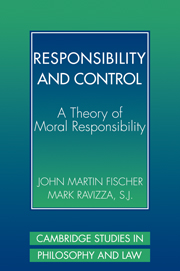Book contents
- Frontmatter
- Contents
- Acknowledgments
- 1 Moral Responsibility: The Concept and the Challenges
- 2 Moral Responsibility for Actions: Weak Reasons-Responsiveness
- 3 Moral Responsibility for Actions: Moderate Reasons-Responsiveness
- 4 Responsibility for Consequences
- 5 Responsibility for Omissions
- 6 The Direct Argument for Incompatibilism
- 7 Responsibility and History
- 8 Taking Responsibility
- 9 Conclusion
- Bibliography
- Index
7 - Responsibility and History
Published online by Cambridge University Press: 05 June 2012
- Frontmatter
- Contents
- Acknowledgments
- 1 Moral Responsibility: The Concept and the Challenges
- 2 Moral Responsibility for Actions: Weak Reasons-Responsiveness
- 3 Moral Responsibility for Actions: Moderate Reasons-Responsiveness
- 4 Responsibility for Consequences
- 5 Responsibility for Omissions
- 6 The Direct Argument for Incompatibilism
- 7 Responsibility and History
- 8 Taking Responsibility
- 9 Conclusion
- Bibliography
- Index
Summary
INTRODUCTION
In previous chapters we have begun to give an account of the sort of control that grounds moral responsibility: guidance control. Roughly speaking, an agent exhibits guidance control of (for example) an action to the extent that the action issues from his own, reasons-responsive mechanism. Thus, there are two important components of this account: the mechanism's being the agent's own, and its being appropriately responsive to reasons. So far, we have focused almost exclusively on the second component: reasons-responsiveness.
The properties in virtue of which a mechanism (or sequence) is reasons-responsive are modal or dispositional properties of an agent at (roughly) the time of the action, omission, or production of the consequence. But in this chapter we shall argue for the claim that moral responsibility is an essentially historical notion. We shall begin by explaining what this amounts to, that is, what it is to be a historical notion. We shall then argue that it is plausible to think that moral responsibility is such a notion.
The history of (say) an action is important in part because it helps to specify what it is for a mechanism to be the agent's own. In the following chapter we shall seek to say more about those features of the history of (for instance) an action that help to make the relevant mechanism the agent's own.
- Type
- Chapter
- Information
- Responsibility and ControlA Theory of Moral Responsibility, pp. 170 - 206Publisher: Cambridge University PressPrint publication year: 1998

